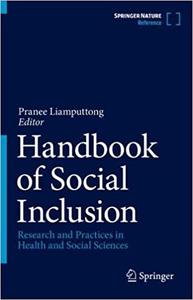

E-Books →Handbook of Social Inclusion Research and Practices in Health and Social Sciences
Published by: voska89 on 22-11-2022, 09:36 |  0
0

Pranee Liamputtong, "Handbook of Social Inclusion: Research and Practices in Health and Social Sciences"
English | ISBN: 3030895939 | 2022 | 2391 pages | PDF | 26 MB
The focus of this ambitious reference work is social inclusion in health and social care, with the aim of offering a good understanding of matters that include or exclude people in society.
Social inclusion stems from the ideal of an inclusive society where each individual can feel valued, differences between individuals are respected, needs of each person are met, and everyone can live with dignity as "the norm" (Cappo 2015). Community participation and interpersonal connections' dynamics that accommodate access to positive relationships, resources, and institutions can lead to social inclusion (Tua & Barnerjee 2019: 110). Social inclusion can explain why some individuals are situated at the centre of society or at its margins, as well as the consequences of the social layer in society (Allman 2015).
Closely related to the concept of social inclusion is social exclusion. Social exclusion refers to "the process of marginalising individuals or groups of a particular society and denying them from full participation in social, economic and political activities" (Tancharoenathien et al. 2018: 3). Social exclusion is marked by unequal access to capabilities, rights, and resources. It is "a multi-dimensional process driven by unequal power relationships across four dimensions - economic, political, social and cultural" (Taket et al. 2014: 3-4). It engages at the individual, household, community, nation, and global levels. Social exclusion renders some individuals or groups to social vulnerability. Thus, these individuals or communities are unable to prevent negative situations that impact their lives.
Methodologically, to promote social inclusion and reduce social exclusion, inclusive research methodologies must be embraced. Inclusive research refers to a "range of approaches and methods and these may be referred to in the literature as participatory, emancipatory, partnership and user-led research - even peer research, community research, activist scholarship, decolonizing or indigenous research" (Nind 2014: 1). Terms such as collaborative research and community-based participatory action research (CBPR) have also been referred to as inclusive research methodology.
As Nind (2014) suggests, the term inclusive research can be adopted across disciplines and research fields within the paradigm of social inclusion. Hence, research and examples that are classified as inclusive research methods are included in this reference.
This reference work covers a wide range of issues pertaining to the social inclusion paradigm. These include the theoretical frameworks that social inclusion can be situated within, research methodologies and ethical consideration, research methods that enhance social inclusion (PAR and inclusive research methods), issues and research that promote social inclusion in different communities/individuals, and programs and interventions that would lead to more social inclusion in society.
The aims and scope of the reference are to provide discussions about:
Read more
Buy Premium From My Links To Get Resumable Support,Max Speed & Support Me
Download From 1DL
https://1dl.net/tcyk2e2dn6tt/kcd9f.H.o.S.I.R.a.P.i.H.a.S.S.rar.html

https://rapidgator.net/file/dc16c7dd970ebb8002ca8718424fa9f4/kcd9f.H.o.S.I.R.a.P.i.H.a.S.S.rar.html

https://nitroflare.com/view/4FEC217F8E81242/kcd9f.H.o.S.I.R.a.P.i.H.a.S.S.rar

https://uploadgig.com/file/download/800f25829b36b54d/kcd9f.H.o.S.I.R.a.P.i.H.a.S.S.rar
https://1dl.net/tcyk2e2dn6tt/kcd9f.H.o.S.I.R.a.P.i.H.a.S.S.rar.html

https://rapidgator.net/file/dc16c7dd970ebb8002ca8718424fa9f4/kcd9f.H.o.S.I.R.a.P.i.H.a.S.S.rar.html

https://nitroflare.com/view/4FEC217F8E81242/kcd9f.H.o.S.I.R.a.P.i.H.a.S.S.rar

https://uploadgig.com/file/download/800f25829b36b54d/kcd9f.H.o.S.I.R.a.P.i.H.a.S.S.rar
Links are Interchangeable - No Password - Single Extraction
Related News
-
{related-news}

